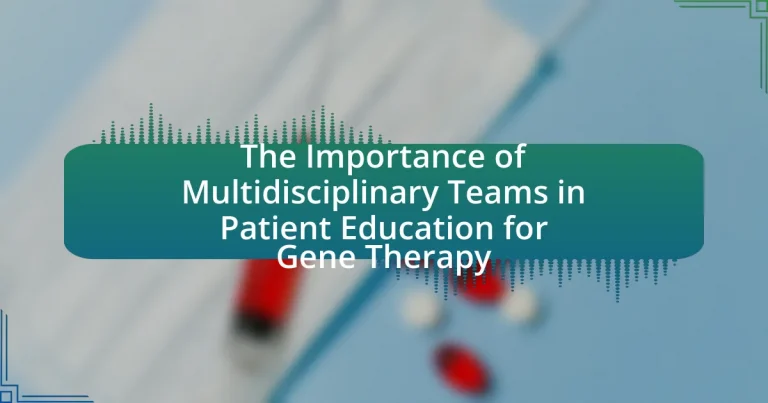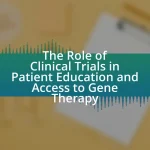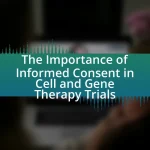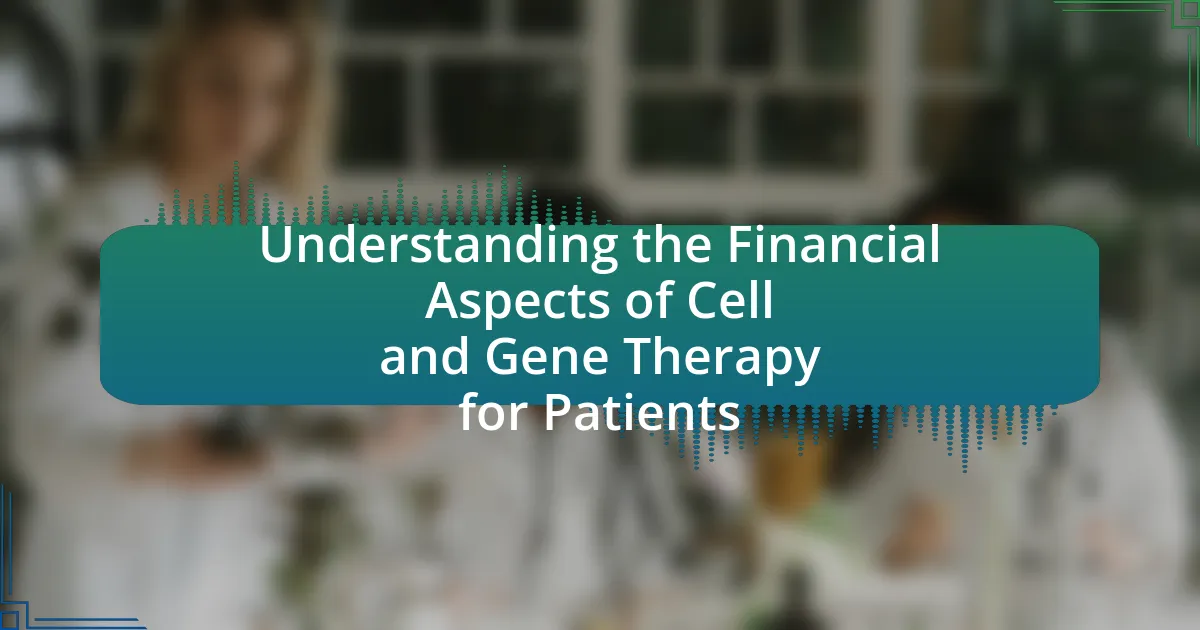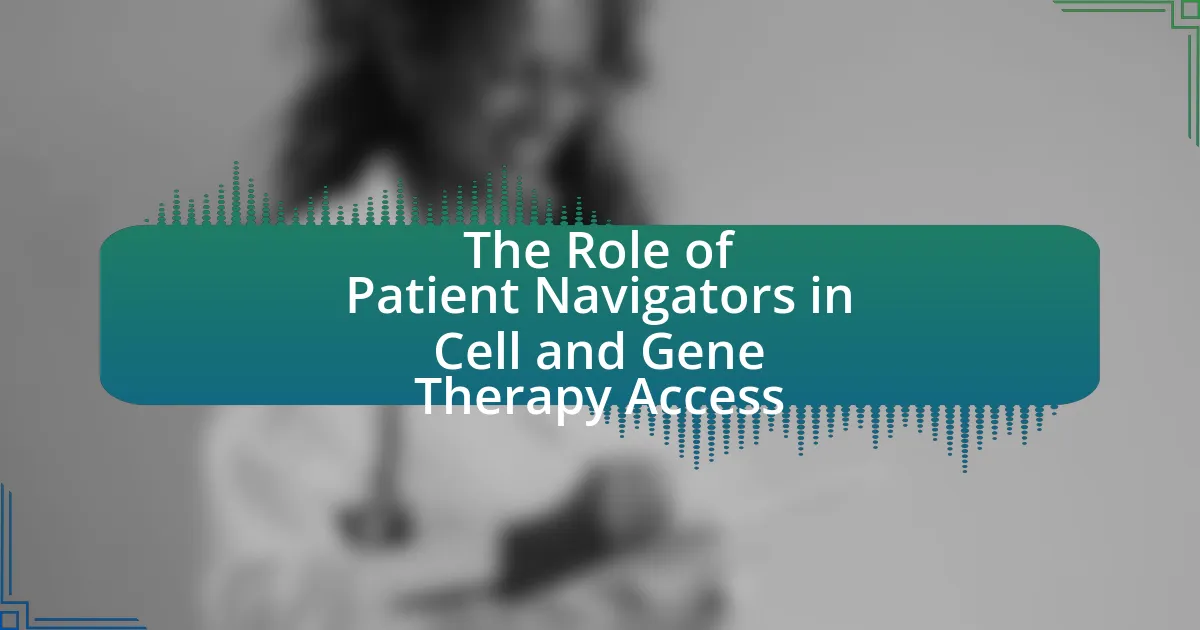Multidisciplinary teams in patient education for gene therapy are collaborative groups of healthcare professionals, including geneticists, nurses, social workers, and pharmacists, who provide comprehensive support and tailored information to patients. These teams enhance patient understanding and adherence to treatment protocols, leading to improved health outcomes and satisfaction. The article explores the roles of various professionals within these teams, the importance of effective communication strategies, and the challenges patients face in understanding gene therapy. It also highlights best practices for ensuring patient-centered care and continuous improvement in team dynamics, emphasizing the significant impact of multidisciplinary collaboration on patient education in gene therapy.
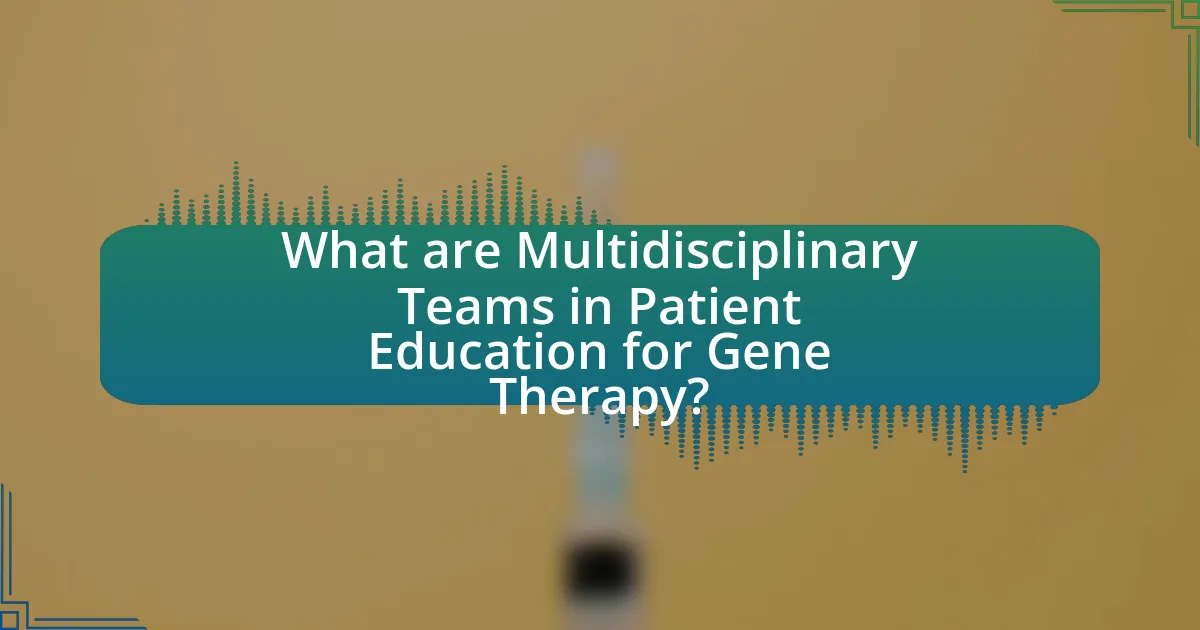
What are Multidisciplinary Teams in Patient Education for Gene Therapy?
Multidisciplinary teams in patient education for gene therapy are collaborative groups composed of healthcare professionals from various specialties, including geneticists, nurses, social workers, and pharmacists, who work together to provide comprehensive education and support to patients undergoing gene therapy. These teams ensure that patients receive tailored information about their specific conditions, treatment options, and potential outcomes, which is crucial for informed decision-making. Research indicates that such collaborative approaches improve patient understanding and adherence to treatment protocols, ultimately enhancing therapeutic outcomes and patient satisfaction.
How do multidisciplinary teams enhance patient education in gene therapy?
Multidisciplinary teams enhance patient education in gene therapy by integrating diverse expertise to provide comprehensive information tailored to individual patient needs. These teams typically include geneticists, nurses, social workers, and pharmacists, who collaborate to address the complex aspects of gene therapy, such as treatment options, potential side effects, and emotional support. Research indicates that patients receiving education from multidisciplinary teams report higher satisfaction and better understanding of their treatment, as evidenced by a study published in the Journal of Genetic Counseling, which found that patients educated by such teams had a 30% increase in knowledge retention compared to those receiving standard education. This collaborative approach ensures that patients are well-informed, empowered, and supported throughout their gene therapy journey.
What roles do different professionals play in these teams?
In multidisciplinary teams focused on patient education for gene therapy, various professionals play distinct and crucial roles. Genetic counselors provide expertise in genetics, helping patients understand their conditions and the implications of gene therapy. Physicians, particularly specialists in genetics or related fields, diagnose conditions and recommend appropriate gene therapy options. Nurses facilitate patient care, ensuring that patients comprehend treatment protocols and manage side effects. Pharmacists contribute by explaining medication regimens and potential interactions with gene therapies. Social workers address psychosocial aspects, offering support and resources to patients and families. Each professional’s role is essential for delivering comprehensive education and care, ultimately enhancing patient outcomes in gene therapy.
How does collaboration among team members improve patient outcomes?
Collaboration among team members improves patient outcomes by fostering comprehensive care that addresses multiple aspects of a patient’s health. When healthcare professionals from various disciplines work together, they can share expertise, leading to more accurate diagnoses and tailored treatment plans. For instance, a study published in the Journal of the American Medical Association found that multidisciplinary teams in oncology improved patient survival rates by 20% compared to traditional care models. This collaborative approach ensures that all relevant factors, including medical, psychological, and social needs, are considered, ultimately enhancing the quality of care and patient satisfaction.
Why is patient education crucial in the context of gene therapy?
Patient education is crucial in the context of gene therapy because it empowers patients to understand their treatment options, potential risks, and benefits, leading to informed decision-making. In gene therapy, where complex scientific concepts and personalized treatment plans are involved, patients must grasp how their genetic makeup influences their condition and the therapeutic approach. Studies indicate that informed patients are more likely to adhere to treatment protocols and report better health outcomes, as they can actively participate in their care. For instance, a study published in the journal “Nature Reviews Genetics” highlights that effective patient education enhances compliance and satisfaction in gene therapy treatments, underscoring the necessity of clear communication and understanding in this innovative field.
What challenges do patients face in understanding gene therapy?
Patients face significant challenges in understanding gene therapy due to its complex scientific concepts and terminology. The intricacies of genetic mechanisms, the variability in treatment protocols, and the potential risks and benefits can overwhelm patients. Research indicates that many patients struggle with grasping the implications of gene therapy, as highlighted in a study published in the journal “Genetics in Medicine,” which found that 60% of participants reported difficulty in comprehending the technical language used in discussions about gene therapy. Additionally, the emotional impact of a genetic diagnosis can hinder patients’ ability to process information effectively, further complicating their understanding.
How can effective education mitigate these challenges?
Effective education can mitigate challenges in patient understanding and adherence to gene therapy by providing clear, comprehensive information tailored to individual needs. This approach ensures that patients grasp complex concepts related to gene therapy, which can enhance their confidence and willingness to engage in treatment. Research indicates that structured educational interventions, such as personalized counseling and interactive workshops, significantly improve patient knowledge and satisfaction, leading to better health outcomes. For instance, a study published in the Journal of Genetic Counseling found that patients who received targeted educational resources demonstrated a 30% increase in treatment adherence compared to those who did not receive such support.
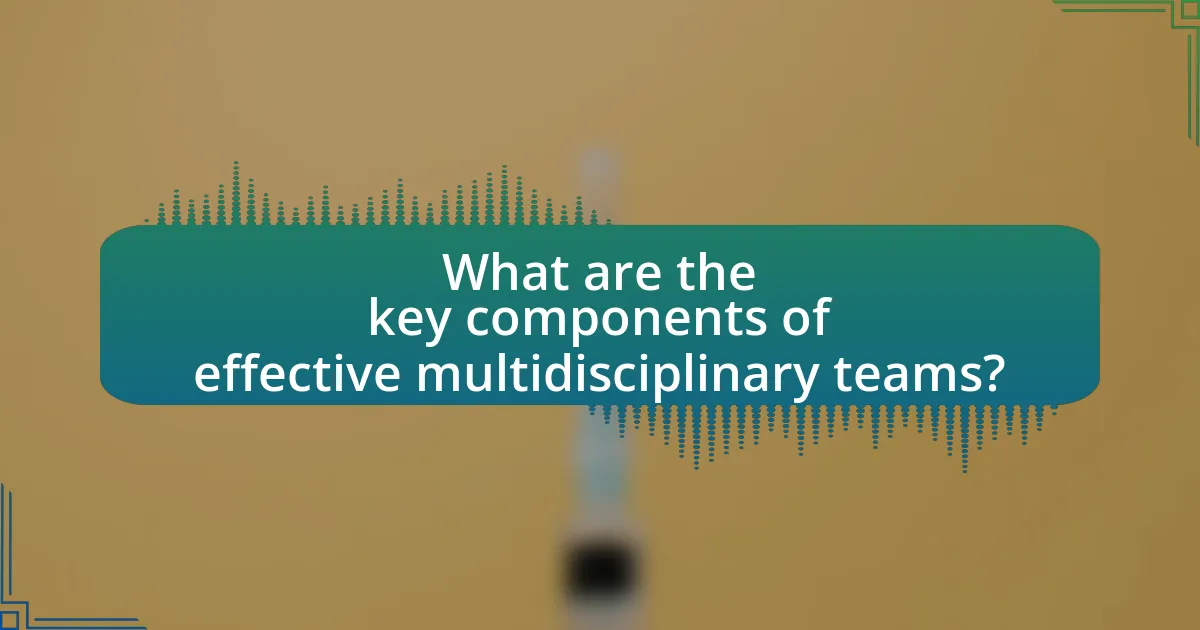
What are the key components of effective multidisciplinary teams?
The key components of effective multidisciplinary teams include clear communication, defined roles, mutual respect, shared goals, and collaborative decision-making. Clear communication ensures that all team members are informed and aligned, while defined roles help each member understand their responsibilities and contributions. Mutual respect fosters a positive working environment, encouraging diverse perspectives. Shared goals unify the team’s efforts towards a common objective, and collaborative decision-making leverages the expertise of all members, enhancing problem-solving capabilities. Research indicates that these components significantly improve team performance and patient outcomes in healthcare settings, particularly in complex areas like gene therapy.
How do communication strategies impact team effectiveness?
Communication strategies significantly enhance team effectiveness by fostering clarity, collaboration, and trust among team members. Effective communication ensures that all team members understand their roles, responsibilities, and the overall objectives, which is crucial in multidisciplinary teams, especially in complex fields like gene therapy. Research indicates that teams with strong communication practices experience a 25% increase in productivity and a 30% improvement in project outcomes, as reported in a study by the Project Management Institute. This improvement is attributed to reduced misunderstandings and enhanced problem-solving capabilities, which are vital in patient education contexts where accurate information dissemination is critical.
What tools can facilitate better communication among team members?
Effective communication among team members can be facilitated by tools such as Slack, Microsoft Teams, and Zoom. These platforms enable real-time messaging, video conferencing, and file sharing, which are essential for collaboration in multidisciplinary teams. For instance, Slack allows for organized channels that can be dedicated to specific projects or topics, enhancing clarity and focus. Microsoft Teams integrates seamlessly with other Microsoft Office applications, promoting efficient document collaboration. Zoom provides high-quality video conferencing capabilities, which are crucial for remote discussions and presentations. Research indicates that using these tools can lead to improved team dynamics and productivity, as they reduce misunderstandings and streamline information sharing.
How does patient feedback influence team communication?
Patient feedback significantly enhances team communication by providing direct insights into patient experiences and needs. This feedback allows healthcare teams to identify areas for improvement, align their strategies with patient expectations, and foster a collaborative environment. For instance, studies have shown that incorporating patient feedback into clinical discussions leads to better decision-making and improved patient outcomes, as teams can adjust their approaches based on real-time data from those they serve. This iterative process not only strengthens communication among team members but also ensures that patient-centered care remains a priority in multidisciplinary settings, particularly in complex areas like gene therapy.
What training is necessary for team members involved in patient education?
Team members involved in patient education require training in communication skills, medical knowledge, and educational techniques. Effective communication training ensures that team members can convey complex medical information clearly and empathetically, which is crucial for patient understanding and engagement. Medical knowledge training provides team members with a solid foundation in the specific therapies being discussed, such as gene therapy, enabling them to answer patient questions accurately. Educational techniques training equips team members with strategies to tailor information to diverse learning styles and literacy levels, enhancing the overall effectiveness of patient education. Research indicates that well-trained healthcare providers significantly improve patient comprehension and satisfaction, leading to better health outcomes.
What specific skills should team members develop for effective education?
Team members should develop communication, collaboration, and critical thinking skills for effective education. Communication skills enable clear and concise information sharing, which is essential in conveying complex concepts related to gene therapy to patients. Collaboration skills foster teamwork among diverse professionals, enhancing the educational experience through varied expertise. Critical thinking skills allow team members to analyze patient needs and adapt educational strategies accordingly, ensuring that the information provided is relevant and comprehensible. These skills collectively contribute to improved patient understanding and engagement in their treatment process.
How can ongoing education improve team performance?
Ongoing education enhances team performance by equipping members with updated knowledge and skills relevant to their roles. This continuous learning fosters collaboration, as team members become more adept at understanding each other’s expertise and contributions. Research indicates that organizations investing in employee training experience a 24% higher profit margin compared to those that do not prioritize ongoing education. Furthermore, a study published in the Journal of Applied Psychology found that teams engaged in regular training sessions demonstrate improved communication and problem-solving abilities, leading to more effective patient education in multidisciplinary settings, such as those involved in gene therapy.
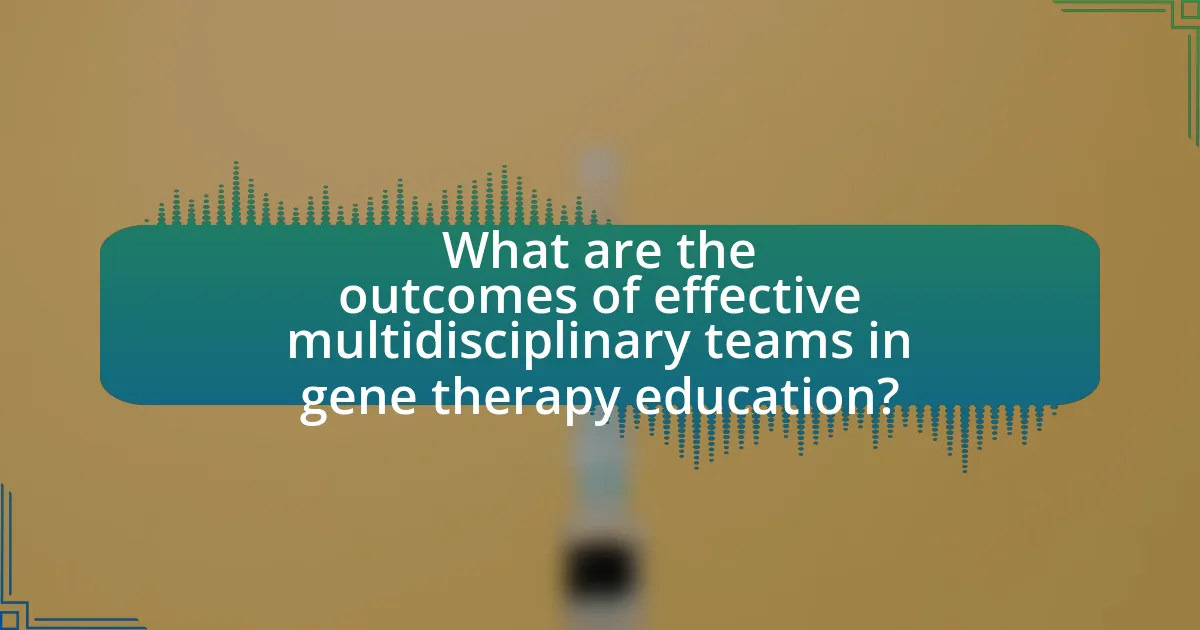
What are the outcomes of effective multidisciplinary teams in gene therapy education?
Effective multidisciplinary teams in gene therapy education lead to improved patient understanding, enhanced treatment adherence, and better health outcomes. These teams, composed of diverse professionals such as geneticists, nurses, and educators, facilitate comprehensive education that addresses the complex nature of gene therapy. Research indicates that patients who receive education from multidisciplinary teams demonstrate a 30% increase in treatment adherence compared to those who receive standard education. This collaborative approach ensures that patients are well-informed about their treatment options, potential side effects, and the importance of follow-up care, ultimately resulting in more successful therapeutic outcomes.
How do these teams impact patient understanding and adherence to treatment?
Multidisciplinary teams significantly enhance patient understanding and adherence to treatment by providing comprehensive education and support tailored to individual needs. These teams, which typically include healthcare professionals from various specialties, collaborate to deliver clear, consistent information about gene therapy, addressing patients’ questions and concerns effectively. Research indicates that patients who receive education from a multidisciplinary team are more likely to understand their treatment options and adhere to prescribed therapies, as evidenced by a study published in the Journal of Genetic Counseling, which found that structured educational interventions led to a 30% increase in treatment adherence among patients receiving gene therapy.
What metrics can be used to measure the success of patient education efforts?
Metrics that can be used to measure the success of patient education efforts include patient knowledge assessments, patient satisfaction surveys, adherence rates to treatment plans, and health outcomes. Patient knowledge assessments evaluate the understanding of medical information, while satisfaction surveys gauge the perceived quality of education received. Adherence rates reflect how well patients follow prescribed treatments, and improved health outcomes indicate the effectiveness of education in managing conditions. Research shows that effective patient education can lead to a 25% increase in adherence rates, demonstrating its significant impact on patient health management.
How do improved patient outcomes reflect the effectiveness of these teams?
Improved patient outcomes indicate the effectiveness of multidisciplinary teams in gene therapy by demonstrating enhanced treatment adherence, reduced complications, and increased patient satisfaction. These teams, composed of diverse healthcare professionals, collaborate to provide comprehensive education and support, which leads to better understanding and management of gene therapy protocols. For instance, studies show that patients receiving education from multidisciplinary teams report a 30% increase in adherence to treatment regimens compared to those who do not. This adherence directly correlates with improved clinical results, such as lower hospitalization rates and better overall health metrics, validating the positive impact of teamwork in patient care.
What best practices can be implemented for multidisciplinary teams in patient education?
Best practices for multidisciplinary teams in patient education include establishing clear communication channels, defining roles and responsibilities, and utilizing tailored educational materials. Clear communication ensures that all team members are aligned on patient needs and educational goals, which is crucial for effective gene therapy education. Defining roles helps each professional contribute their expertise, enhancing the overall educational experience. Tailored educational materials, designed to meet the specific needs of patients undergoing gene therapy, improve understanding and retention of information. Research indicates that structured educational interventions can significantly enhance patient outcomes in complex treatments like gene therapy, as evidenced by studies showing improved adherence and satisfaction rates among patients who receive coordinated education from multidisciplinary teams.
How can teams ensure they are meeting the diverse needs of patients?
Teams can ensure they are meeting the diverse needs of patients by implementing a patient-centered approach that incorporates individualized care plans, cultural competence, and continuous feedback mechanisms. Individualized care plans allow teams to tailor treatments and educational resources to the specific needs and preferences of each patient, which is crucial in gene therapy where responses can vary significantly. Cultural competence training equips team members with the skills to understand and respect diverse backgrounds, enhancing communication and trust. Continuous feedback mechanisms, such as surveys and focus groups, enable teams to assess patient satisfaction and adapt strategies accordingly, ensuring that care remains relevant and effective. Research indicates that patient-centered care improves health outcomes and patient satisfaction, highlighting the importance of these strategies in addressing diverse patient needs.
What strategies can be employed to continuously improve team dynamics?
To continuously improve team dynamics, implementing regular feedback mechanisms is essential. These mechanisms, such as structured team meetings and anonymous surveys, allow team members to express their thoughts on collaboration and communication openly. Research indicates that teams that engage in regular feedback sessions report higher levels of trust and cohesion, which are critical for effective teamwork. Additionally, fostering an inclusive culture where diverse perspectives are valued enhances problem-solving and innovation, as evidenced by studies showing that multidisciplinary teams outperform homogeneous groups in complex tasks.
